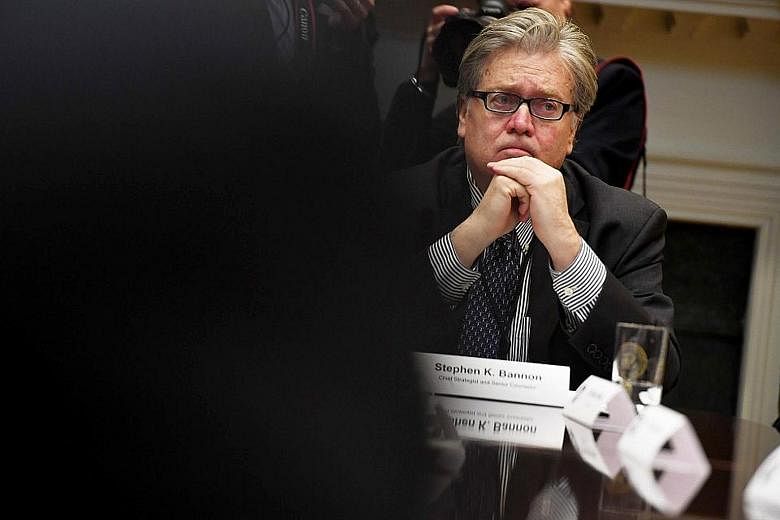Two days ago, Time magazine put a severely sullen-looking man in a thinker's pose on its cover, dubbing him The Great Manipulator.
"Is Steve Bannon the second most powerful man in the world?" its headline inside asks. Going by the first two weeks of Mr Donald Trump's presidency, there seems little doubt the answer is yes.
Some would argue that, short of being authorised to sign executive orders, Mr Trump's chief strategist is the world's most powerful man.
"President Bannon?" questions the New York Times in another headline last week, after the 63-year-old former executive chair of far-right news website Breitbart News was given a seat at the National Security Council table, an unprecedented move that has shocked former and current White House officials from both political parties.
That elevation in status sealed suspicions of Mr Bannon's influence over the politically inexperienced President, sending the hashtag #StopPresidentBannon to the top of Twitter's trending chart.
By mid-week, worried lawmakers had fought back, with the Democrats introducing legislation to kick Mr Bannon out of the council in a bid to keep politics separate from security matters.
Whether or not they succeed, Mr Bannon's grip on policymaking - and his determination to disrupt the old political establishment and reinstate "enlightened capitalism" in the US will not let up.
While the world reeled from the announcement last week that refugees, and citizens of seven Muslim- majority countries were banned from entering the US, it emerged that Mr Bannon was behind the directive to subject US green card holders to scrutiny as well, overriding recommendations by the Department of Homeland Security to leave them alone.
So how did an Irish Catholic boy from a working-class, pro-union Democratic family in Virginia become the flag-bearer of the "alt- right" movement and the key figure in the Oval Office drafting some of the most conservative national policies? As attention is heaped on Mr Bannon, who has been labelled a "white supremacist" since he became chief executive of Mr Trump's presidential campaign last August, he has mostly kept away from the media, declining to give interviews.
But there is no mystery over his complex world view as journalists piece together a picture of the man and his ideas through past interviews, radio shows and documentaries he has produced.
"I'm not a white nationalist, I'm a nationalist. I'm an economic nationalist," he told The Hollywood Reporter in a rare interview last November, before the presidential election. "The globalists gutted the American working class and created a middle class in Asia. The issue now is about Americans looking to not get f...ed over."
The Virginia boy, who spent seven years as an officer in the US Navy, transcended his own blue-collar roots by going to Harvard Business School in 1985. He already had a master's degree in national security studies from Georgetown University. He became an investment banker at Goldman Sachs, then started his own boutique investment bank specialising in media. One of the TV shows he had a stake in - and ended up profiting tremendously from - was the hit sitcom Seinfeld.
Mr Bannon told Bloomberg his interest in politics did not surface until he was serving in the Navy and became disillusioned by then President Jimmy Carter, a Democrat, although he did not say why.
"I became a huge (Ronald) Reagan admirer. Still am. But what turned me against the whole establishment was coming back from running companies in Asia in 2008 and seeing that (George W.) Bush had f...ed up as badly as Carter. The whole country was a disaster."
CLASH OF CIVILISATIONS
Just the year before, Mr Bannon had written a proposal for a three- part movie with the working title, Destroying The Great Satan: The Rise Of Islamic Fascism in America, warning of radical Muslims taking over the US and turning it into the "Islamic States of America".
The Washington Post, which got hold of this proposal, last Friday reported that the eight-page draft "offered an early glimpse of Bannon's belief that the West and 'supremacist' Islam are headed for a 'fundamental clash of civilisations', as the outline said".
It is but one more example that the media cites as indicative of Mr Bannon's bleak, antagonistic outlook, which he essentially delivered through Mr Trump's angry "American carnage" inaugural speech - one he supposedly penned.
Mr Bannon has spoken about the country's "crisis of capitalism" and the erosion of "Judeo-Christian values" which have led to the rise of socialism, secularism and pluralism that have altered the social and political fabric of America.
"I'm a Leninist," he apparently told historian Ronald Radosh at a party in 2013, referring to the Russian revolutionary. "Lenin wanted to destroy the state, and that's my goal, too. I want to bring everything crashing down, and destroy all of today's establishment," Mr Bannon reportedly said.
President Trump is supposedly the tool in achieving his vision, political watchers argue. Mr Trump was given a platform on Mr Bannon's Breitbart News Daily radio show early on in the presidential campaign, and steered - through a combination of flattery and leading questions by Mr Bannon - to state far-right views.
Mr Bannon has tried it before. Politico magazine reported that he had cultivated populist former Alaska governor Sarah Palin as a potential anti-establishment presidential candidate before he turned his sights on Mr Trump.
If the first two weeks of the new Trump administration are any indication, Mr Bannon has struck gold. As Time magazine said, quoting a veteran Republican: "It's already over, and Bannon won."


